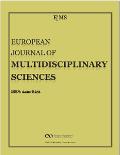
The European Journal of Multidisciplinary Sciences
Online ISSN: 2421-8251
European Publisher
Code of Ethics
Code of Ethics for European Journal of Multidisciplinary Sciences (EjMS)
About EjMS
EjMS is a peer-reviewed journal that selects and publishes research in the social and behavioural sciences. The Code of Ethics describes EjMS's policies for ensuring the ethical treatment of all participants in its publication process. EjMS authors, editors, and reviewers are encouraged to review these guidelines and address any questions or concerns to the EjMS Editor-in-Chief, at
General Responsibilities of Editors
To support and maintain the integrity and freedom of expression in scientific research.
To strive to meet the needs of readers and authors.
Apply consistent standards in their peer-review processes and ensure its fairness and lack of bias.
To select which papers submitted to the journal to publish and providing authors with an explanation to the editorial decision of manuscripts submitted.
Evaluate manuscripts without regard to the authors' race, gender, sexual orientation, religious belief, ethnic origin, citizenship, or political philosophy.
Consider objectively monitoring the performance of peer reviewers and editors and consider manuscripts submitted for publication with reasonable speed.
Accept responsibility for all text published in journals.
Maintain confidentiality about a manuscript under consideration. After a decision has been made regarding its publication, the editors may disclose or publish titles and authors’ names of accepted papers.
Never to sue unpublished materials disclosed in a submitted paper.
Encourage peer reviewers to consider ethical issues related to the research reviewed.
Act sensitively when publishing images of objects of cultural significance or that may offend.
Editorial Responsibilities
To ensure publications were not previously published.
To guard that publications do not contain any copied material from published or copyrighted work.
To remove any inaccurate, false, misleading, obscene, scandalous, or unlawful text or graphic.
As needed, to publish clarifications (errata), corrections, retractions, or apologies.
Responsibilities of Authors
Submit only original works, citing and quoting the works of others.
Inform the editors in writing whenever the submitted research is funded.
Identify sources of support for a manuscript. Write an acknowledgment.
Ensure submissions do not include plagiarism or and self-plagiarism (also known as duplicate publication).
Notify the editor in writing about any related manuscripts under consideration by another publisher or in press. Forward copies of these manuscripts to the editor.
When requested, provide the data and a description of the research methods used.
Promptly notify the journal editor or publisher and cooperate with the editor to retract or correct any significant error or inaccuracy in the author’s work.
The corresponding author must sign the EpMS copyright, certifying that the article is an original work, that it has not been published previously, and that is not under consideration for publication elsewhere in any form.
Complaints
Complaints to the publisher must be related to an author, reviewer, article, editor, or publisher.
Any potential conflict of interest should be directed to the editors.
Editors are responsible for the timely and thorough investigation of all complaints and for reporting the outcome of the investigation to the complainant. The decision of the editorial board is final.
References
Committee on Publication Ethics (COPE). (2011, March 7). Code of Conduct and Best-Practice Guidelines for Journal Editors. Retrieved from here.
